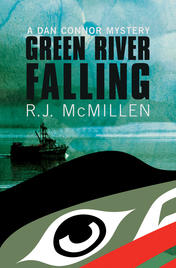Fiction

ONE SUMMER NIGHT NEAR CLOSING TIME an old hunchbacked woman entered my girlfriend’s Laundromat and walked over to the counter, tilting her head sideways to look at the cigarette display rack. Viola sat behind the counter sorting receipts while I crouched near the window emptying quarters from the Double-Load Thor machines. “How much for a small pack of smokes?” the woman asked. “Seven dollars,” Viola whispered. She had a sore throat and her scratched, bruised voice sounded like a distant echo of itself. “I’ll buy one. But I don’t have any cash on me at the moment,” the woman said. “Give me a pack and I’ll pay you tomorrow.” “Sorry, we don’t accept credit.” “That’s okay sweetheart. That’s smart.” The woman pointed a finger at Viola. “You’re in business. You think like a businesswoman, I can tell. I’m in business too. I read people’s palms, that’s my business.” I knelt in front of the last Thor machine, struggling with the coin slot. The Thor key was old and worn, and it took me longer and longer each night to unlock the slots and empty the quarters. The Belgian-made machines were energy-efficient front load washers that held more clothes than the usual Maytag models. The only problem was they were no longer being manufactured, so there were no replacement parts available. I remembered when Viola bought the Laundromat five years ago there were fifteen Thor machines all along the wall, and now there were only nine. Every time one died we dismantled and stripped it for parts to keep the others alive. I emptied the final coin slot, locked it back in place, and then stood up and looked over at the counter and saw Viola and the hunchbacked woman were gone. I walked to the counter with the Tupperware container of quarters and noticed the back hallway door leading to the storage room was open. The telephone rang, startling me. I put the container of quarters on the counter and reached over and picked up the phone. “Good evening, Central Laundromat,” I said. A faint humming sound buzzed at the other end of the line but no one was there. I hung up. A moment later I heard footsteps in the hall and Viola and the woman stepped through the doorway. Viola walked behind the counter, reached up for a pack of Player’s Light cigarettes, and placed it in the woman’s open hand. “Don’t forget what I told you sweetheart,” the old woman said. “I’ll stop in from time to time to check on you and see how things are going. I care about you. Everyone calls me Mama. I’m everyone’s mother. Ask anyone and they’ll tell you.” The old woman walked to the front door and closed it quietly behind her as she left. I looked at Viola. “Did she read your palm?” “Yeah,” she whispered, looking at her watch. “It’s already after ten. Did you finish emptying all the machines?” “They’re all done. But what did she say?” “I’ll tell you later.” She took the keys out of her pocket and walked to the front door and locked it. She flipped the “Closed” sign around in the window so that the “Open” side faced in.

CHAPTER ONE “Can I help you find something, dear?” she asks, from atop a spindly-legged stool. Short and squat, she hooks her truncated limbs over the highest set of rungs. Her knitting flows forth onto the hard packed dirt floor, a pink woollen waterfall cascading over her abundant belly. “No, thank you, ” I reply, continuing to browse. I hate questions like this. It makes all the fine, lightly browned hairs on the back of my neck stand up. I hate them almost as much as I hate help, particularly from strangers. “I’m just looking.” “Well, I can see that, ” she says, “but what is it you’re looking for?” She plucks a pair of glasses from her nose and rests them on her floral-covered bosom. She smoothes out her bird’s nest mane of yellowish-white hair, expertly whipping it into a bun and securing it with a spare needle. “You can’t find what you want if you don’t know what you need.” I murmur my assent, but don’t meet her gaze. I don’t want to encourage the press of her familiarity, and I silently curse myself for leaving my visit so late. Earlier, the aisles of the Flea Market would have been full of prospective buyers; but, at this hour, the crowds have thinned considerably. She smells a sale and launches herself in my direction. “As you can see, ” she says, “I’ve got something for everyone, dear. All kinds of nice things.” Mm-hmm. She does – not necessarily nice – but things nonetheless. Her kick-stand table is piled high with brooches, books, buttons and other bric-a-brac – a strange assortment of items that have even less charm than they do worth. However, as I glance over her wares, I’m drawn to one piece in particular – a cameo pendant – a softly pearled profile set in calcified curls. I lift it from the table, running my fingers over the slightly raised image. It reads like Braille, giving rise to a memory so old I almost have to blow the dust from it. My Nana gave my sister a pendant very much like this once. It was Rachel’s birthday. She was thirteen and wore the piece with a budding womanly pride. I was five and filled with childishness and envy. She guarded it as though it were the Crown Jewels – unclasping it and placing it carefully on her nightstand each evening before she went to bed. I was forbidden from touching it. She said I’d dirty it – the filigreed face – and that I was too young to understand. She was wrong. She didn’t understand. All I wanted to do was hold it. One morning, I took it without asking, pocketing the pendant before kindergarten for Show-and-Tell. I knew it wasn’t mine to either show or tell, but I didn’t care. The secret weight of its presence in my pocket made me feel like someone special – the transporter of important goods – even if they weren’t mine. Naturally, I later lost it in a schoolyard game of hide-and-go-seek. Rachel was livid, and nothing could convince her that I wasn’t the guilty culprit. Of course, I lied, and even constructed a paperclip chain to replace it; however, this act of contrition only bought me clemency from my parents. Rachel accepted the offering – she had no choice – but I don’t think she ever quite believed me, nor forgave me.

“There are channels,” she said, “for adopted kids who want to find their parents. There are also agencies that specialize in it.”
“I know. This is different. Ian said I should talk to you.”
“Ian …” Collie said. As if there could be more than one answer.
“Ian McLaren.”
Anna let her head drop to her desk . From that position, she heard Collie’s response.
“Mandrake.”
“Uh … I don’t think he likes being called Mandrake,” the prospect said.
“I don’t think we liked the last four clients Mandrake sent us,” Collie countered. Reluctantly, Anna lifted her head.
“What exactly did Mandrake say about us?” she asked.
The prospect turned to her with undisguised relief. Apparently he was tired of talking to Collie.
“He said you were a retrocognitive clairsentient.”
“And do you know what that means?” Anna asked. “Because I don’t.”
Collie made a choking sound, which alarmed Anna until she realized it was the start of a laughing fit.
“Did Mandrake tell you that we specialized in anything?” Anna asked.
“He said to ignore the sign on your door.”
Anna glanced at the door. Maybe it had changed since her arrival five minutes earlier.
Nope. It still read, “Colette Kostyna, Public Relations.”
“Most people ignore it,” Anna said. She glared at Collie, who had more or less finished laughing. “Please step in anytime.”
“We’re, uh, not well-qualified detectives,” Collie said. “We just have some specialized knowledge and, because of that, we’re able to work within a certain community. I really am a PR person most of the time.”
“Huh.” The kid tried to lean back. His chair didn’t do that, so he gave it up and settled for resting one leg on the other, right ankle over his left knee. “I would have figured a retrocognitive clairsentient would be more broadly useful than that.”
“Regardless,” Collie said, “the situation is as I described it. So Ian was probably wrong to point you in our direction.”
“He told me what you did in Victoria,” the kid said. Anna was surprised to hear herself snort.
“And you took that as a recommendation?”
He looked at her, emotion seeming to push his sharp features forward.
“Yes,” he said. “I told you I was in kind of a different situation.”
“Look,” Anna said, “Rowan … is it actually Rowan?”
The kid smiled. Something about the smile made Anna feel bad for him again.
“Ever since I can remember.”
“Rowan, Colette and I have one, ah, skill in this detective thing. One. You can call us if you have a problem you can’t explain to the police or to a real detective without sounding like you’re crazy. That’s it. If you can explain it to a normal person, or if you don’t care that you sound nuts, we are not for you. I mean … unless you’re pretty sure things can’t get much worse, I would question hiring us for any reason at all. Except PR. Collie knows how to do that.”
Collie raised her travel mug to Anna.
“We have got to get you on tape, make some infomercials.”
“I’m just saying,” Anna said, looking Rowan in the eye, “we can’t guarantee that we will not screw up and cause trouble. Unless you need our … unique point of view … you’re better off with professionals.”
Rowan shook his head and Anna got the sense her little speech had meant nothing to him. He had the look of a guy in the midst of a downpour who’d been threatened with a squirt gun.
“You have another skill.”
So that was what retrowhatsis meant. She’d figured as much. Fucking Mandrake.







